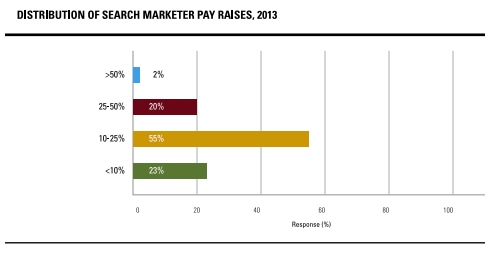The 2014 Search Marketer Survey by BrightEdge aimed to uncover the sentiment around some of the burning questions of 2014, like, “How do we measure our content?” “Where do we get our data?” And, “How do we further our marketing careers?”
The survey report, released this week, touches on questions in several areas such as rank, content management systems, SEO tools, content budgets, and more. Here’s a look at some of the highlights, beginning with content.
Seventy-eight percent of SEOs said connecting content efforts to ROI in 2014 versus in 2013 will be “more important” (35 percent) or “much more important” (43 percent).

Eighty-four percent also agree that knowing the ultimate impact of traffic, conversions, and revenue will be “more important.” And, if knowing the true impact of content could be achieved, 52 percent of survey respondents said they would allocate between 10 to 25 percent more budget to content strategy.

Why all the mystery around content and content performance? Jim Yu, chief executive (CEO) of BrightEdge, says technology needs to be leveraged to connect the dots between content and ROI.
“In order to succeed, marketers need powerful technology that can help them harness massive data in real time, and a platform that can break down the silos within the organization, bringing content creators into the fold for seamless collaboration,” Yu said.
BrightEdge’s page-centric approach to tracking and reporting has helped some marketers make the shift from keyword “(not provided)” data to a more holistic view of content performance at the page level, Yu said.
In its recent survey, BrightEdge asked marketers about the shift from tracking keywords to tracking pages. Eighty-five percent stated the page-based approach would be “more” important or “much more” important in 2014.
From the report:
“SEOs are also still focused on the business impact of the keyword (90 percent), though the shift in focus to the page leaves only 50 percent stating that measuring the business impact of the keyword will be more important in 2014.”

How do marketers view rank today? Ninety-five percent of those surveyed said accurate rank data of their Web pages is at least as important in 2014 as it was in 2013.
Savvy SEOs know to track rank across search engines, mobile devices, local, and global in 2014:

Content management systems also play a part in how well content can perform, and how efficient it is to create and optimize content. The BrightEdge survey asked respondents what content management systems they used. Thirty-two percent said WordPress.

Today, many marketers value data from multiple sources. The BrightEdge survey revealed tools like Google Webmaster Tools (90 percent), Moz (56 percent), Majestic SEO (34 percent), and SEMrush (26 percent) as favorites for gathering data.
But taking a piecemeal approach can cause a fragmented view of a campaign’s performance, Yu said.
“Successful content marketing is driven by real-time data at quantum scale. Piecing together the sheer volume of data – more than 2.7 zettabytes and growing – is overwhelming without powerful technology,” he said.
He added that BrightEdge’s Data Cube gives marketers in-depth and on-demand access to data that fuels their campaigns.
And you can’t have successful SEO campaigns without the right staff. In its survey, BrightEdge wanted to gauge the career landscape for the industry. Of the respondents, the majority (74 percent) had two or more years experience in the search marketing field.
Among the job promotions that occurred in 2013, respondents said they had greater responsibility (79 percent), pay raises (63 percent), a higher title (57 percent), and greater visibility in the marketing organization (46 percent) as a result.
Fifty-five percent of those who received a raise saw an increase in pay between 10 to 25 percent.

Is there a correlation between years experience, promotions, and pay raises? Yu weighed in:
“Our survey shows that successful SEOs are rapidly ascending in their organizations,” he said. “We believe that promotions and pay rises are correlated to results more than years of experience. Innovators deliver results, and those that deliver results progress in their career.”
BrightEdge sees a bright future for SEO careers if professionals take the right steps to cultivate in-demand skills.
“With all the changes in search, content is now the center of the marketing universe. SEOs are now content marketers,” Yu said. “Successful SEOs today blend art and science, bolstering their creative efforts with technology and analytics.”





